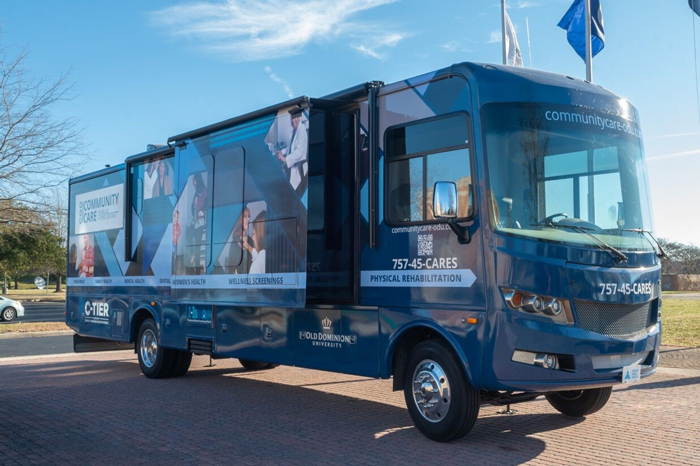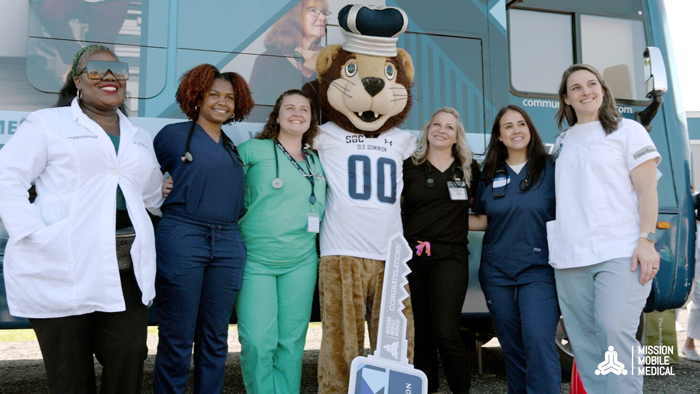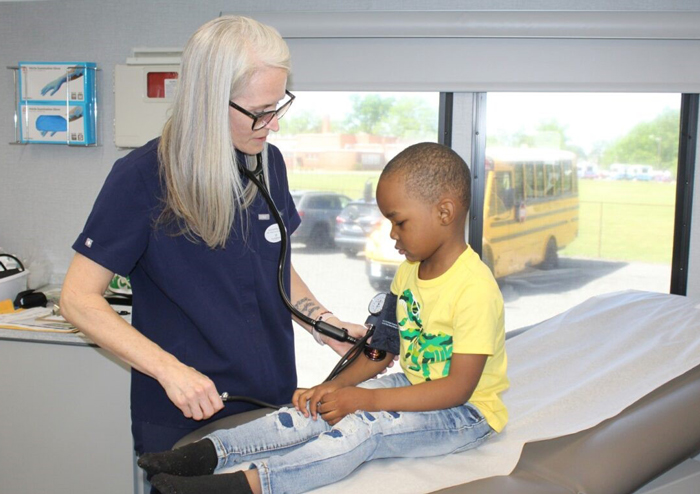Old Dominion University's Student-Run Mobile Health Clinic
- Need: To fill gaps in care for rural communities in southeastern Virginia while providing clinical placement opportunities for nursing students.
- Intervention: A free mobile health clinic staffed by Old Dominion University nursing students that visits rural schools and other community centers.
- Results: Hundreds of students have gained hands-on rural experience working in the clinic since its launch.
Description
In the spring of 2023, Old Dominion University's School of Nursing launched a new mobile health clinic staffed by nursing students and overseen by nursing faculty. The clinic was created with two goals in mind: to bridge gaps in primary care in rural southeastern Virginia by bringing free care to medically underserved communities, and to provide clinical placement opportunities for nursing students. By staffing the mobile health clinic with students, from undergraduates up to the doctoral level, the program gives future healthcare professionals hands-on experience providing care in a rural setting. Many of the patients served by the clinic are uninsured, unable to afford regular appointments with a primary care physician, or unable to travel out of their communities to see a primary care physician.
The clinic is currently funded by a four-year Health Resources and Services Administration (HRSA) Nurse Education, Practice, Quality and Retention-Mobile Health Training Program (NEPQR-MHTP) grant awarded in 2022.

Read more about the mobile clinic in the Rural Monitor article Nursing Students Bring Free Care to Rural Virginia with Student-Run Mobile Health Clinic.
Services offered
The mobile health clinic has partnered with towns and school districts in southeastern Virginia to offer free care three days a week at stops that include community centers, such as local fire stations, and schools. The clinic serves a rural region that has few primary care physicians and no local specialists.
On a given day, the clinic is staffed by a faculty member who acts as lead provider – typically a nurse practitioner – along with a range of students that may include Bachelor of Science in Nursing (BSN) students, nurse practitioner students, Doctor of Nursing Practice (DNP) students, and students in the university's Human Services program. Patients can be treated for acute issues, such as infections or injuries, or can receive general wellness exams and assistance in managing chronic conditions. Certain days may be dedicated to specialty areas such as dental care, mental health counseling, physical and occupational therapy, and speech language pathology; students in these specialty programs are brought in to work in the clinic as needed. For example, a student studying to become an athletic trainer might be called in to help perform physicals for high school athletes on a designated day. The clinic has also partnered with Sentara Health's mobile mammogram van to dedicate one day a month to women's health.

For faculty and students who live in other parts of the state, the university has rented a townhouse in the rural town of Franklin. Students and faculty can stay at the townhouse and immerse themselves in the community for up to a week while working in the clinic.
The mobile clinic is not intended as a substitute for primary care. To help patients get back into regular primary care, clinic staff can assist them with insurance enrollment or contact local health care providers to refer a patient into care.
Results
The clinic saw roughly 100 adults between May and November 2023, and saw more than 500 children for back-to-school or sports physicals during that time. More than 200 students across various disciplines have participated in ODU Community Cares events.
Challenges
Because ODU's student-run, university-affiliated mobile clinic is the first of its kind that the program's organizers are aware of, designing and creating the clinic meant building a model from scratch without a “playbook” to work from, they said.
Continuing to build community partnerships, and figuring out a sustainable long-term funding model, are also ongoing priorities.

Replication
Clinic organizers encourage other universities interested in establishing a similar program to talk to local communities first to find out what kinds of care and services are most needed. Having input and support from the communities the clinic serves has been key to the clinic's success thus far, clinic organizers say. A thorough community needs assessment can help point organizers in the right direction when getting a mobile clinic program off the ground.
Contact Information
Tammy Speerhas, DNP, FNP-C, CEN, Director, ODU Community CareOld Dominion University School of Nursing
tspeerha@odu.edu
Topics
Health workforce education and training
· Health workforce pipeline
· Interprofessional training of the health workforce
· Mobile and episodic healthcare delivery
· Nurses
· Population health
· Recruitment and retention of health professionals
· The South
· Uninsured and underinsured
· Wellness, health promotion, and disease prevention
States served
Virginia
Date added
November 8, 2023
Suggested citation: Rural Health Information Hub, 2023 . Old Dominion University's Student-Run Mobile Health Clinic [online]. Rural Health Information Hub. Available at: https://www.ruralhealthinfo.org/project-examples/1126 [Accessed 23 February 2026]
Please contact the models and innovations contact directly for the most complete and current information about this program. Summaries of models and innovations are provided by RHIhub for your convenience. The programs described are not endorsed by RHIhub or by the Federal Office of Rural Health Policy. Each rural community should consider whether a particular project or approach is a good match for their community’s needs and capacity. While it is sometimes possible to adapt program components to match your resources, keep in mind that changes to the program design may impact results.
